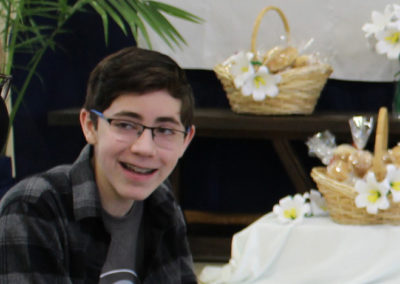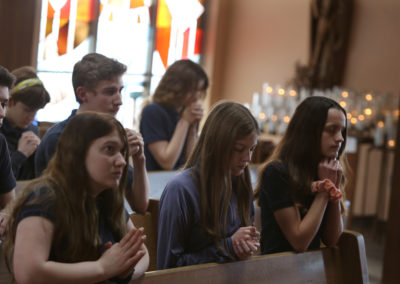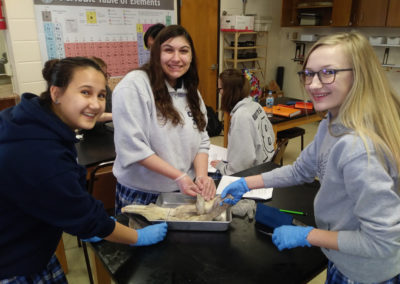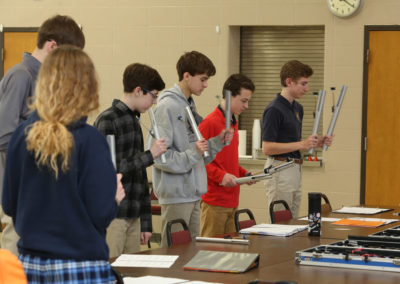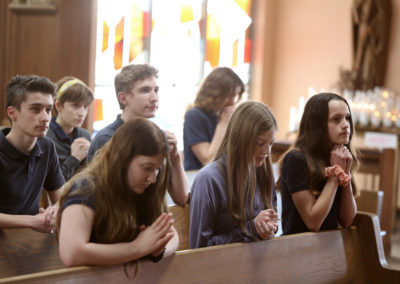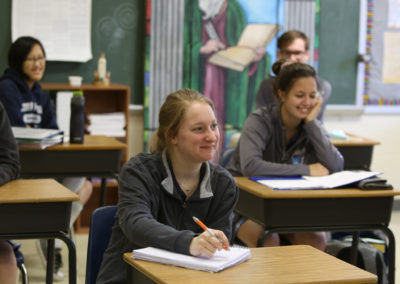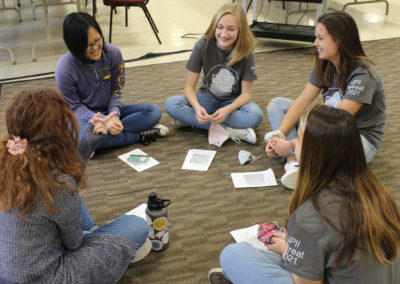High School Theology
Bioethics/Apologetics 12th Grade
Fr. Peter Fonseca
Senior Bioethics examines ethical issues in health care through the lens of the Catholic moral tradition. It will engage specific teachings of the Catholic Church that bear directly on issues of health care ethics, regarding the sanctity and dignity of human life from the moment of conception until death. Through weekly lectures, readings, and discussions, as well as case studies, and a final paper, students will be exposed to the foundational principals of medical ethics and prepared to defend their Catholic faith while living in the culture of death.
Apologetics reminds students of St. Peter’s exhortation for Christians: “Always be ready to give a defense to anyone who asks you for a reason for the hope that is in you, but do it with gentleness and respect” (1 Peter 3:15). This course will introduce students to the art of fulfilling this mandate to explain and defend the Truths of our Catholic Faith. It will teach students how to overcome objections to the faith in a charitable, patient, and respectful manner by presenting the logical, biblical and historical case for the Catholic Christian worldview.
- Biomedicine and Beatitude: An Introduction to Catholic Bioethics, Nicanor Austriaco, O. P., 2011.
- Catholic Controversies: Understanding Church Teachings and Events in History, editor Stephen Gabriel, 2010.
Philosophy 12th Grade
Mr. Sebastian Garren
The Philosophy Course will be a gradual, historical introduction to Western Philosophy treating the natural philosophy of the Pre-Socratics, studying the ethical philosophy of Socrates and Plato, surveying Aristotle’s works and his philosophic achievement, and finally ending with the philosophia of St. Thomas Aquinas.
- History of Philosophy: Greece and Rome by Fr. Frederick Copleston SJ
- Selected Dialogues of Plato: Charmides, Lysis, Laches, Ion
Morality 11th Grade
Mr. Nathan Arends
The objective of this course is to come to understand and be able to apply the fundamental principles of Roman Catholic moral theology in the virtue tradition of St. Thomas Aquinas. Students will acquire an introductory understanding of the moral life in Roman Catholic theology, an introductory understanding of the acquired and infused moral virtues. An introductory understanding of virtue’s role in relation to the natural and supernatural attainment of the end of human life, and an introductory understanding of the concepts of natural law, obligation, freedom, conscience and moral development.
Additionally, students will acquire an introductory understanding of intentionality, in relation to the object, end and circumstances of human action and begin to analyze the various ways in which human moral agency is intertwined in a world where good and evil often intersect, including where our actions contribute to the evil actions of others and where they make use of the results of the evil actions of others.
- The Moral Life in Christ published by Sophia Institute
- The Four Cardinal Virtues, Josef Pieper
- Handbook of Moral Theology, Dominic Prummer, OP
- Veritatis Splendor, John Paul II, Vatican Press
- Deus Caritas Est, Benedict XVI Vatican Press
- Catechism of the Catholic Church, Vatican Press
Church History 10th Grade
Mrs. Lynn Dery
The objective of this course is to help the students to better understand the historic perspective of the salvation that God offers to mankind after the Redemption. It is imperative for them to see that the Church is made up of human beings…who sin. There are periods of history where sin abounded, but this study will show that “where sin increased, grace abounded even more.” God allowed growth in holiness during and after difficult periods of history. It is also important for them to understand that the Church is the only institution that has stood the test of time, through good times and bad, as her founder Jesus Christ promised that the “gates of hell would not prevail against her” (Mt 16:18).
A second goal for the class is to learn note taking skills from the power point lectures and organize them on their home days, using the Cornell Method of note taking and the study guides.
- The History of The Church, A Complete Course: Didache Series, Midwest Theological Forum.
- Catechism of the Catholic Church, Vatican Press
Sacred Scripture and the Paschal Mystery 9th Grade
Mrs. Lynn Dery
The revelation of God in Jesus Christ is transmitted through Scripture and Tradition as one common source. Sacred Scripture is the speech of God as it is put down in writing under the breath of the Holy Spirit. Tradition transmits in its entirety the Word of God which has been entrusted to the apostles by Christ the Lord and the Holy Spirit. The Word of God in written or oral form is interpreted authentically by the Magisterium of the Church.
Although the Bible is made up of many books, together those books tell one story. God created us perfect in the beginning, but our first parents, through their free will, sinned and brought death upon themselves and their descendants. The rest of the Bible tells how God gave human being the means to salvation. We learn how God chose the people of Israel to lead all people back to Himself, and how God the Father completed that work in His only Son, Jesus Christ and His sacrifice on the Cross. Finally, we learn the truth about the end of history: good triumphs, evil fails, and the people of God live forever in paradise.
Sacred Scripture is not the only authority for our faith, as Scripture itself tells us. The Church was founded by Jesus Christ to keep the living Tradition of the faith alive. At Pentecost, after the death and resurrection of Christ, God poured out the Holy Spirit upon the Apostles to swell in and guide the Church. The teaching of the church opens up all the riches of the Bible to us. Because we have the living truth of the Church, we can rea Scripture with more confidence, more understanding, and more freedom.
- Understanding the Scriptures, A Complete Course: Didache Series, Midwest Theological Forum.
- Catechism of the Catholic Church, Vatican Press


